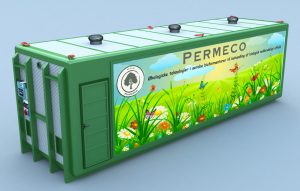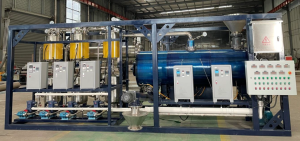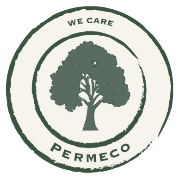Closing Loops – Pyrolysis of agricultural biomass

Pyrolysis has the potential to halve the climate footprint of agriculture. However, a relatively high moisture content in the biomass is a major challenge to making pyrolysis profitable, and the partners in this project want to do something about this. This is done by pre-drying the biomass through microbacterial processes and infrared treatment, thereby optimizing the yield – biochar, gas and pyrolysis oil.
Purpose
Pyrolysis is a chemical recycling process that has the potential to reduce climate emissions by 6-7 million tons of CO2e. This corresponds to more than halving the climate footprint of agriculture if all biomass is in principle pyrolyzed.
It is of course not realistic to pyrolyze all biomass, but it illustrates how great the potential is for the technology.
This is particularly relevant in light of the fact that Danish agriculture accounts for approximately 22 percent of total greenhouse gas emissions, and the vast majority – namely 19 percent – comes from cattle farming.
Therefore, the partners in this project want to collaborate on developing a new technique to reduce CO2 emissions from cattle farming through increased efficiency in the utilization of biomass.
Pre-drying optimizes the yield of pyrolysis for the benefit of soil conditions and carbon storage
The project is a collaboration between the companies Permeco, Waste2Value, Netek, Persolit, E. Marker and Plast Center Danmark.
The problem owner in the collaboration is the Permeco experimental farm, which is an experimental farm with a focus on cattle farming. On the farm, a waste stream is generated in the form of biomass from the approximately 700 animals (suckling cows plus calves) as well as from residual products such as grass pulp, straw and stumps. The total annual amount of biomass is in the order of 10,000 tons p.a.
First, the biomass is subjected to aerobic fermentation in a “composting reactor”.
Simply put, it is a large container where aeration and “stirring” of the biomass is ensured. The gases released during the composting process are passed through a biofilter (operated in a closed system so that emissions can be controlled), where over 90% of the emissions are collected and bound in water, which is then stripped of ammonia. This process removes 70 to 80 percent of the moisture content in the biomass, which is then prepared for the pyrolysis process after another IR drying process.
The dried biomass is pyrolyzed in a reactor without the presence of oxygen, whereby a conversion occurs into biochar, gas and oil. Biochar can be added to agricultural and horticultural soil as a soil improver and as carbon storage.

Permeco’s biofermentor
Partners contribute to further optimization and development of the processes
The problem solvers are the company Waste2Value, which in collaboration with Netek is responsible for infrared (IR) drying and pyrolysis of the biomass after microbacterial drying at Permeco, which itself is also contributing to the solution of the problem.
Persolit are technology suppliers within technical insulation and safety coverage. The companies will contribute to further optimization and development of the processes involved.
Marker A/S is a potential buyer of the produced biochar. During the project period, the company will contribute with requirement specifications for the produced biochar, conduct initial tests on the effect of the produced biochar as a soil improver in horticulture and on golf courses.
The knowledge center Plast Center Danmark will handle the professional project management, contribute with knowledge about the quality and use of the produced biochar, pyrolysis oil and gas, and handle various ad hoc tasks that may arise during the project period.

Pilot pyrolysis plant installed at Waste2Value
Project partners:
 Permeco – Experimental agriculture working on biomass optimization
Permeco – Experimental agriculture working on biomass optimization
![]() Waste2Value ApS – Operation and optimization of pyrolysis plants
Waste2Value ApS – Operation and optimization of pyrolysis plants
![]() Persolit A/S – Technology development on pyrolysis plants
Persolit A/S – Technology development on pyrolysis plants
![]() Netek A/S – Technology development on pyrolysis plants & IR drying of biomass
Netek A/S – Technology development on pyrolysis plants & IR drying of biomass
![]() E.Marker A/S – Contribute with requirements specifications, conduct initial tests on the effect of the produced biochar as a soil conditioner
E.Marker A/S – Contribute with requirements specifications, conduct initial tests on the effect of the produced biochar as a soil conditioner
![]() The Foundation Plast Center Danmark – Professional project management, provide knowledge about testing and analysis of oil, gas and biochar and participate in the project on an ad hoc basis
The Foundation Plast Center Danmark – Professional project management, provide knowledge about testing and analysis of oil, gas and biochar and participate in the project on an ad hoc basis
Read more about Closing Loops here (in Danish) >


 For further information, please contact:
For further information, please contact:

- Dorte Walzl Bælum
- Network Director
- B.Sc. Chem. Eng., M.Sc. in Business
- M: 60 35 19 90
- E: dwb@dmn-net.com


